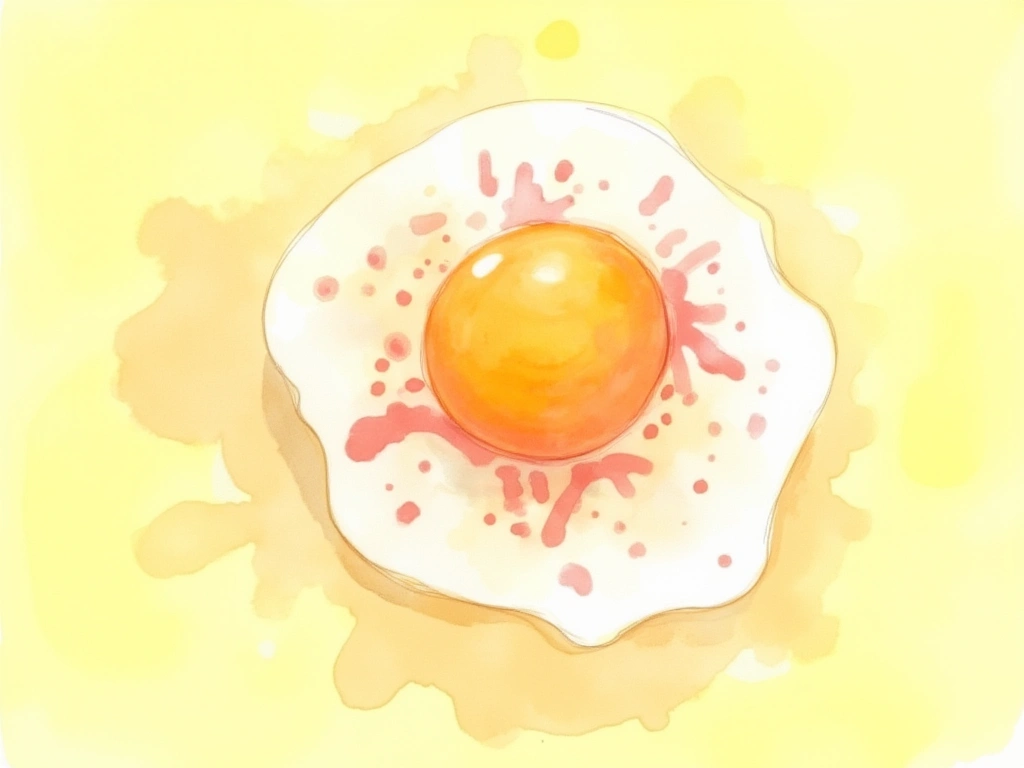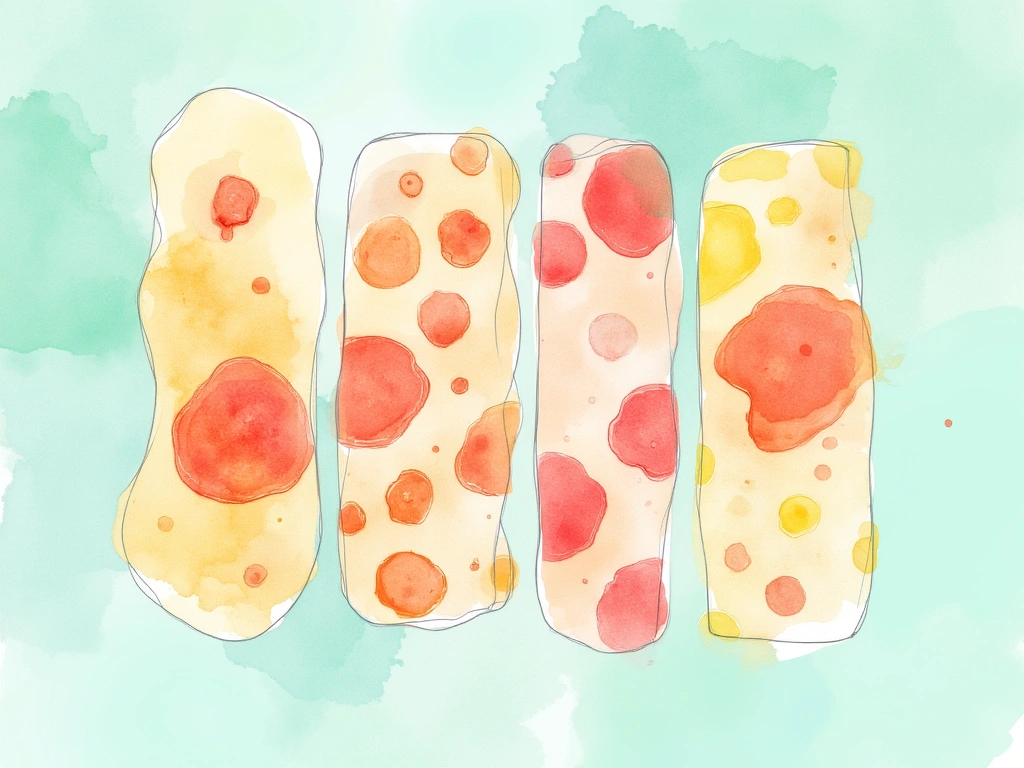- Suspect eggs might be linked to your seborrheic dermatitis? You’re not alone.
- Eggs are a common allergen: Could they be triggering your skin condition?
- Explore the potential connection: Learn about the science and personal experiences.
- Simple dietary change: See if cutting out eggs can make a difference for your skin.
After carefully observing my diet and noting how foods affect my skin, I began to suspect a connection between seborrheic dermatitis and eggs. It turns out, I wasn’t the only one exploring this potential link.
Many people online, particularly those following grain-free diets, rely on eggs as a major protein source. Popular anti-candida resources often highlight eggs as a safe protein option. While general websites mention eggs as a potential allergen with possible skin symptoms, finding direct connections to seborrheic dermatitis was less common – except for a few individuals who, like me, found relief by avoiding eggs.
![][1]
But when dealing with stubborn conditions like seborrheic dermatitis, sometimes you need to think outside the box. If solutions were obvious, forums and blogs wouldn’t be filled with people searching for answers.
The key is to experiment and find what works for you. Could that daily breakfast of eggs be contributing to your ongoing seborrheic dermatitis?
Here are the main reasons why I believe there might be a link between seborrheic dermatitis and eggs:

Eggs as a Common Food Allergen and Seborrheic Dermatitis
According to sources like Wikipedia and Mayo Clinic, eggs are indeed a common food allergen. Interestingly, the allergenic part of the egg varies. For some, it’s the egg white, while for others, it’s the yolk, due to different proteins in each.
Egg White Allergens: Common culprits in egg whites include ovomucoid, ovalbumin, ovotransferrin, and lysozyme, with ovomucoid being the most frequent offender.
Egg Yolk Allergens: Egg yolks contain different antigens (substances triggering immune responses), such as livetin, apovitillin, and vosvetin.
For more detailed information, Health Canada offers an in-depth article on egg allergies:
http://www.hc-sc.gc.ca/fn-an/pubs/securit/2012-allergen_egg-oeuf/index-eng.php
Could your body be reacting to egg allergens and manifesting this reaction as seborrheic dermatitis? Perhaps your system is attempting to manage this allergic response by pushing it out through the skin. While this is just a theory, the best way to investigate is through direct experience: try eliminating eggs for a week and observe any changes in your skin.

Diverse Allergic Reactions and Skin Symptoms
Searching online for allergy symptoms reveals an extensive list of potential bodily reactions. Over time, scientists and healthcare professionals have linked a vast array of symptoms to allergies.
Skin rashes, relevant to this discussion, are a well-known allergy symptom. Seborrheic dermatitis, while distinct from a typical rash on an arm or leg, is indeed a skin condition characterized by rash-like symptoms. The unique nature of the skin affected by seborrheic dermatitis, particularly facial skin, might explain the variation in rash presentation.
The combination of skin irritation and increased oil production in seborrheic dermatitis can create an ideal environment for bacteria to thrive on the skin’s surface. Furthermore, when the body is actively managing an allergic reaction, its capacity to maintain optimal topical immune function might be compromised.

Allergy Sufferers and Atopic Conditions
Research indicates a higher likelihood of individuals with allergies developing atopic conditions throughout their lives. These conditions include asthma, eczema, and others.
A helpful article on this topic explains that managing allergens can often lead to the restoration of the immune system functions responsible for atopic conditions. You can read the full article here for a clearer understanding:
http://www.positivehealth.com/article/skincare/atopic-eczema-help-for-sufferers

Eggs and Seborrheic Dermatitis: A Starting Point
This information provides a starting point for exploring the potential link between eggs and seborrheic dermatitis. It’s not exhaustive, but it’s intended to guide your own investigation. Ultimately, personalized trial and error is often necessary to find answers.
For me, significantly reducing eggs in my diet led to a near elimination of seborrheic dermatitis. It’s possible other foods I still consume contain similar allergens, and I do occasionally eat eggs as complete avoidance can be challenging.
By carefully monitoring my diet and experimenting, I’ve been able to broaden my food choices while significantly improving my daily energy and mood. My approach now focuses on minimizing flare-triggering foods and prioritizing foods that support my overall condition.
If you’ve also noticed a connection between seborrheic dermatitis and eggs, please share your experience in the comments below. Or, if you have other effective strategies for managing your seborrheic dermatitis, please share your insights with fellow sufferers and me.

Do you also avoid wheat and dairy?
Reply PermalinkHi Tim,
Since writing this post I’ve actually been eating eggs quite often.
It seems to be more of a correlation between greasy food in general and the flare ups.
I’ve tried avoiding wheat and at the time I thought it seemed to help, but honestly I think it’s mostly how you perceive the food you eat. If you read somewhere that wheat is the cause then have the idea implanted in your head that wheat could be the problem, the thought becomes implanted in your mind. Then if you eat wheat your mind starts second guessing and anxiety hits. This anxiety alone seemed to be a strong trigger for me.
I’ve always avoided dairy even before I got the seborrheic dermatitis. I usually get stuffed up if consume a bunch of dairy.
When I was having intense seborrheic dermatitis outbreaks I attempted to consume a ton of fermented dairy beverages such as kefir and yoghurt. These didn’t seem to do very much for me.
Currently I’ve have been going about +7 months without any aggressive seborrheic dermatitis. My face is clear from flaking, scaling and redness. My scalp is also clear from any intense dandruff (if I don’t shower for a while, I can get a tiny bit of dandruff forming, but usually a shower fixes that up) and I don’t use any antidandruff shampoos anymore. Sometimes I get a fews flakes in my ears or a few tiny ones in the nasal folds, but that’s it. This post and the comments have some more details on to what I am doing and other general discussion.
If you have any updates in your treatment please do update, it would be very interesting to hear how things unfold.
Reply PermalinkHope this helps. Best of luck!
Its been two years since i was diagnosed with sebhoric dermatitis.all along i have been on streoid creams and tacrolimus.two weeks ago i changed to oilatum cream which was doing well.for three days consecutively i have been eating eggs and just this evening it occurred to me that maybe its eggs.i want to try and cut that from my diet and see what happens
Reply PermalinkHi Saad,
Thanks for chiming in. This eggs post is quite old. Currently I eat a lot of eggs and this has become one of my main sources of protein. High quality eggs are amazing sources of protein and a good variety of other micro-nutrients. Actually reduced my meat consumption and increased my egg consumption.
Not sure if you seen it yet, but this is my most latest and most successful approach:
My Seborrheic Dermatitis Skin Regimen 2.0
Hope that helps and best of luck!
Reply PermalinkLook forward to any updates.
Hi,
First of all, thank you Michael, for the effort you have put in into the research.
My skin has been getting quite dry and flaky occasionally. And since it has been happening on and off, the stimulanse must be coming from something environmental. I researched my symptoms and it correlates mostly with seborrheic dermatitis.
I noticed that the symptoms’ timing roughly corresponds with me eating eggs. I tried going egg-free for three days, but I realized that many of the things I’m eating have eggs in them, and that has slowed down the process of finding out the truth. In the following three days, I’ll be more strict about what I eat so I can avoid eggs completely.
However, I had four eggs today to check if that would make things worse, lo and behold, 2 hours after that, my mustache area started itching, and I got red and flaky skin on the left side of my mustache and on the sides of my nose. I’m now 70% sure that the problem is in eggs.
Since it takes my skin one day to clear up by 50%, and two days to clear up by 85%, I should be certain about eggs in two to three. After that, I’ll report back to you whether eggs are the sure cause of my seborrheic dermatitis or not.
I know there might be some other causes for these symptoms, and that’s why I’ll keep my diet the same for the period of the test. I’ll be having the following:
Bulletproof coffee, sardines with salad, and chicken or beef with vegetables.
I both hope that eggs will be the problem so I can settle this for good, but I also hope they are not so I wouldn’t miss a staple in my diet.
I hope the best for everyone.
Reply PermalinkI have been suffering from SB for half my life. Mostly on the scalp and face. Recently it got worse, i started to lose a lot of hair including eyebrow and beard hair and there was this constant terrible itch . This freaked me out so i started looking for a cure. First I stopped eating grains, then I stopped stopped eating dairy. But unfortunately this didn’t reduce the flakes and hairloss. Then I read this post and I realized that I have been eating eggs for breakfast almost every day. I stopped eating eggs for 3 days and I started to drink a glas of water with 2 tablespoons of ACV every day. My SB has cleared for 70%!! The hairloss however is still continuing I hope it stops soon.
Reply PermalinkHi Mohammed,
Thanks for such a detailed report. Happy to hear that your skin is clearing up so quickly. Perhaps you may have been secretly allergic/sensitive to eggs.
Personally, I’ve added eggs back into diet a long time ago. Sometimes the mind can trick you into believing things which may not necessarily be true.
How long ago have you added the bullet-proof coffee? I think this may actually be a huge piece of why your skin may clearing up. It contains the specific medium chain triglycerides that have been shown to have anti-fungal potential against the malassezia documented to be responsible for SD. So potentially the internal consumption is providing topical benefits. These same fatty acids are a large part of my own solution, which I have wrote about in a previous post:
My Seborrheic Dermatitis Skin Regimen 2.0
Hope that helps and look foward to any updates.
Reply PermalinkAll the best.
Hi Ibrahim,
Happy to hear of the results. A while after writing this post I added eggs back and have been depending on them for one of my main protein sources. SD has remained clear. So for me it wasn’t really a solution.
However, after seeing more comments like yours there may in fact be something here for a certain number of individuals who don’t handle eggs too well.
Overall though I believe SD is closely related to fatty acids in the body.
Thanks for checking in and providing your experience.
If you get a chance, considering checking-in at a later time to update on how things went.
All the best.
Reply PermalinkI noticed that my skin was flareing like crazy lately, severe dandruff on my scalp and rash on my head, dandruf in my eyebrows and dry flaky skin under my eyes around the side of my nose and also in my ears.
Reply PermalinkI am aware that I have reactions to dairy and try to cut dairy products out all together. I weight train in the gym an thus require a high amount of protein for muscle rebuilding and since I can’t take whey protein or any other high protein dairy products I was eatting a lot of eggs.
My mam told me to eliminate eggs as they were the only thing that I was eating religiously as I’d eat about 5 or 6 eggs a day.
Since I cut them out my skin is starting to clear up a lot and I do believe it’s from stopping eating eggs.
I broke out in a severe form of seborrheic dermatitis on my scalp, it actually affected my hair, it was so bad. I finally went to the dermatologist but by the time I got in for the appointment it seem to cool down a little bit, so not much was noticed. After finding out I had seborrheic dermatitis after revisiting the doctor 2 more times. I started to link the changes in my diet. I had been eating eggs in order to lose some weight and never was a huge egg eater in the past. However, once I stopped eating the eggs and was egg free for a couple of months my scalp completely returned to normal. now I have found that I can eat eggs every once in awhile and be okay but if I have a large amount of eggs throughout the week my whole head inflames. The very interesting part is that I went and seen an allergist and I was tested for eggs and they did not find that I had any allergic reactions to them, however it only affects my scalp, so I don’t know if it’s the fact that eggs cause inflammation, or what causes it or why it links to seborrheic dermatitis, but after a year I know for sure that eggs are the reason for my seborrheic dermatitis, so I eat them in moderation and especially try to avoid them in large quantities. I have had some off and on this week and my head is getting itch and usually ill find a bump or 2 and thats when ive ate to much and need to chill out on eggs. Also drinking 8 glasses of water a day really help alot and also limiting your caffeine to 1 - 2 cups, by doing all of those things I am able to keep myself seborrheic dermatitis free for the most part
Reply PermalinkI hope this helps someone out there as I struggled for a long time before I figured out anything between the link of eggs and SD… Thanks for reading
Sonia, thank you for your reply, my SD has been bad for a while, as a body builder/powerlifter I eat about 10 egg whites everyday for breakfast, no yolk as I am allergic to yolk but not the whites. I’ve tried all sorts of shampoos and can’t quite calm it down any, I have suspected it may be due to eggs, and possibly caffine. I am thinking about cutting out eggs and having a protein drink and some out meal or something instead and see how my scalp handles it. I have the dermatiitis on my scalp. I’m curious as to the turn out.
Reply PermalinkI’m wondering if eggs trigger my flare ups as my skin has calmed down since I have stopped having two eggs for breakfast each day.
I still have Rosacea on my checks but the scaling and sore dermatitis that I get on my checks and chin has reduced considerably after controlling the flare ups with Elidin.
Reply PermalinkOnly after my kids were diagnosed with egg allergies amongst others and egg was removed from our home did I make the correlation between egg and my longstanding dermatitis. By avoiding egg especially lightly cooked/raw my condition is 90% improved. I still eat baked egg. Maybe removing this would clear up the last issues but I worry then about maybe becoming super egg sensitive. All current research points to building up tolerance with manageable exposure. So baked edd stays!
Reply PermalinkI’ve taken eggs out of my diet and reintroduced them to see my skin flare-up. I didn’t even know this was called Seborrheic Dermatitis until seeing this post, but now am in no doubt that they are linked and this is what I have!
Reply Permalinkhi
Reply Permalinki agree with you that eggs and itchy scalpy hv a relation … if i take one egg daily …after few days my scalp gets itchy …i hv to stop it n after few days of medicated shamppo it is better …once a week egg seems not to bother .
one imp thing i found and wanted to share about the ongoing topic is that Organic Eggs they hv been giving me better results …the poultry eggs have the allergins to create SD issues and other complications , but now i have shifted from poultry eggs to PURE ORGANIC EGGS and my scalp is totally clear … but it is better not to take too much eggs on daily basis especially in summer season. Hope this will help .
Reply PermalinkI do body building and egg is there in my daily diet. I generally suffers from a itchy scalp and dandruff kind of thing falling from my scalp but from few days like one week or so, i am not taking egg and now my scalp is absolutely fine.i am not getting if the itching is due to yolk or white. Now i will take only white for few days and notice the symptoms.
Reply PermalinkThere’s a definite correlation between SD and eggs for me. I’m also histamine-sensitive, so I’ll notice that my breathing is more labored after consuming even a little bit of something containing eggs (like mayo).
I’ll have symptoms that I know were triggered by something I don’t consume regularly, so backtracking my diet in the last 24 hours is always a reliable way to troubleshoot the problem(s).
Caffeine is a SD trigger for me, so for those of you who are wondering if you should cut out your coffee, do it. Tea doesn’t give me any problems.
Reply PermalinkJMathew - just wondering how it’s going since you stopped eating eggs and limiting your caffeine? I am still doing those things pkus drinking lots of water and I find it still works well. Doctors say I’m crazy that there is no possible way that eggs link to SD on the scalp, however, I know my body and I’m the one struggling with it and without a doubt i know what works and what causes it to be worst. Here’s a story, so I had a bad breakout over the holidays and I couldn’t figure out why, thinking to myself that I had ate eggs one morning as usual on a Saturday or every other week and hadn’t had any extra,but didn’t realize how many eggs were in all that good holiday food we had ate. Cake, cookies, pie, ect. And when it dawned on me that my normal intake of eggs had been expanded and in a wide variety of holiday food, I was so aggravated that I was trying to keep my SD under control and it itched so bad and my beautiful long locks started getting tangled and dry. I had to be very careful with my hair and did have a few inches cut off because it took such a toll on it, but today I’m back to good and Now I’m even more conscious about what I eat and whether or not it has eggs in it and how much to have or not have. Other than that I remain fairly clear with the same old routine. I use Nizoral shampoo occasionally because its the only one that has the ingredient " ketoconazole" which fights fungas and I use it especially after i have an egg which I will have once every 2 weeks or so depending on how my scalp is doing and that’s it. I find really amount up my water allows me to have a little more caffeine if i need it. I love my coffee. So How’s things going for you now that’s it been awhile? Have u found any new things that work for you?
Reply PermalinkI will be waiting for your response. I’ve never tried to see if it was the yolk or the egg white that bothered my scalp, yet I’ve had a lot of people ask me which part of the egg I’m “allergic” to… I hope u find something out and stay clear and itch free as I know how bothersome it can be. I love eggs and wish I could eat then whenever I wanted to, but I just stick to every once in awhile then I use my Nizoral shampoo about once a week and I stay calm. I guess that’s better than nothing…
Good luck, Sonia
Reply PermalinkThere has been an absolute correlation for me. I thought my scalp issue was related to having a cat or products I used in my hair.
Funnily, I saw chickens push out eggs and it grossed me out so much. I stopped eating eggs for a long time and I was fine. Soon as I reintroduced them into my diet I began having severely itchy patches form on my scalp and I had lots of hair loss.
What prompted me to search for this correlation was having a direct flare after eating egg foo young.
I had immediate flare symptoms and now I know it’s the eggs which sucks because I thought they were a healthy part of my diet. Not the case.
I’m sure there are studies on this but the egg industry is too large for anyone to go up against it. I’ve found that Clobetasol also helps reduce flaring but hopefully being more disciplined with removing eggs will eliminate my use of the steroidal medicine.
Reply PermalinkI’m suffering from this condition from last 3 years …can anyone suggest me some do’s and dont’s to get rid of this
Reply PermalinkAnd from last 3 yrs im experiencing hairfall and itchiness continuously in my scalp …
This is very depressing …
Should i cut off non veg ?
They’re linked for me as well. Another possible machanism is avidin, the lectin in egg white that binds to biotin. It is reduced when cooked, but not eliminated. Biotin deficiency can cause sebborheic dermatitis. People say the biotin in the yolk should offset the effect of avidin, but as someone who suffered a legitimate biotin deficiency from a perfect storm of diet/supplement mistakes, and who never had SD before the biotin issue, I can tell you that even eating cooked eggs brings the SD back for me. I ate eggs periodically for my whole life without a problem until the biotin issue. I’m wondering if frequent egg consumtpion can decrease
Reply PermalinkBiotin status.
All these years, it wasn’t the hair products, peanut butter, dairy or workout sweat. It was eggs! Today you confirmed my suspicion.
Reply PermalinkThank you so much for posting.
Having followed a reduced dairy Ketogenic way of eating for a couple of years and healing several things including guttate psoriasis, I tried carnivore before Christmas and ate just meat for 2 weeks. My skin and scalp cleared. Over the holidays I had some eggs for breakfast and within an hour I was red and my skin was dry and scaling. A week later I tried mayo on a piece of meat and within 30 minutes I had hot itchy skin which was visible to my family. Since January I have done controlled trials with eggs and they are definitely the culprit for me. I haven’t needed any of my steroid creams since excluding them from my diet. I am watching tv and simply googled eggs and sebhorric dermatitis to see was I alone?! I’m so I’m glad to have found this page. Hopefully others will trial cutting eggs and get great results! I wish I’d tried this 30+ years ago!
Reply Permalink20 years ago while bodybuilding, I used to go through around 12-14 egg whites aday and never had a problem with any kind of skin condition. Now at 45 and started lifting weights about 12months ago, and after reading an few articles about not wasting the yolk of each egg because of the nutrients plus the fact of cost, I been having between 6-8 full eggs a day. Until today I had no idea about any relation to eggs and any skin conditions, but have been diagnosed with seborrheic dermatitis which seems to be worsening. I am on face creams and medicated shampoos, but always comes back. After what I read today, I will stay away for a couple of weeks and see if there’s any change.
Reply Permalink